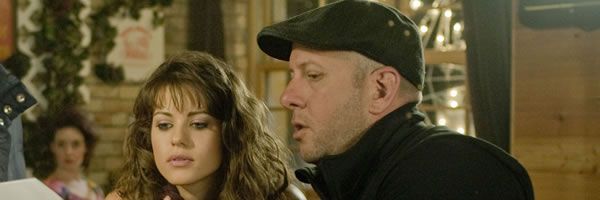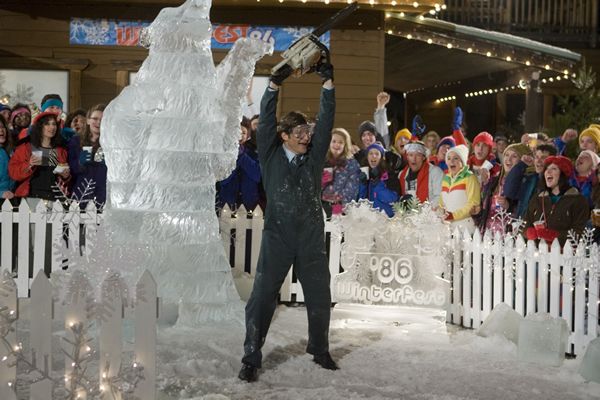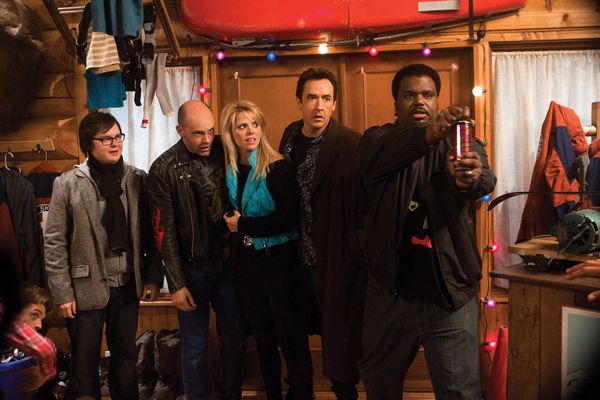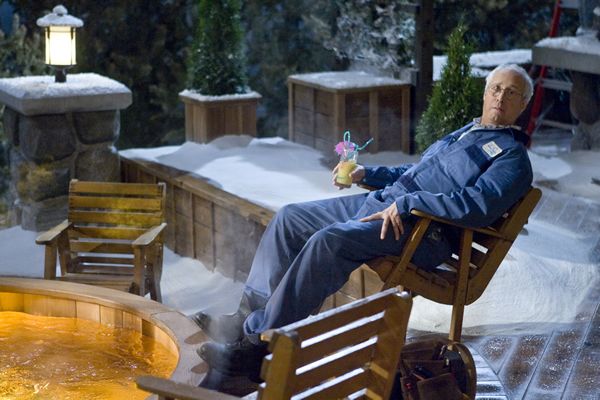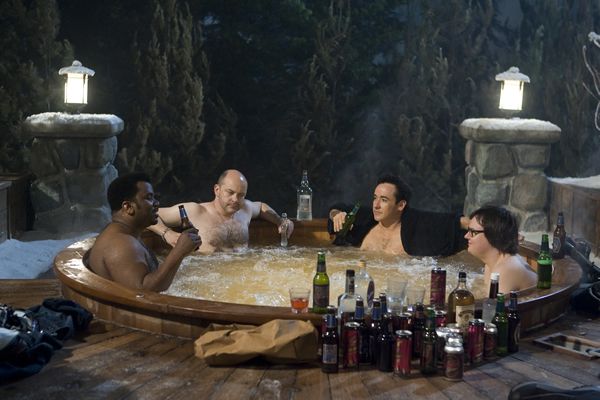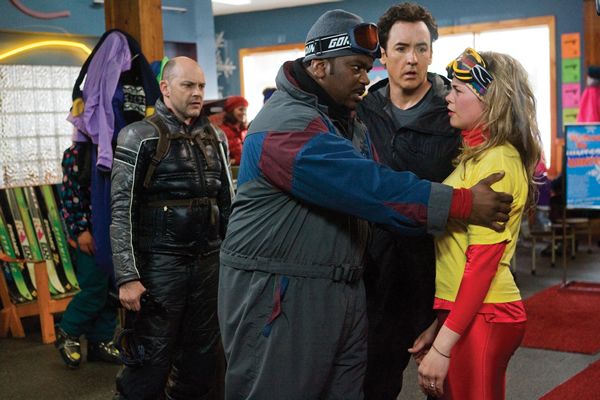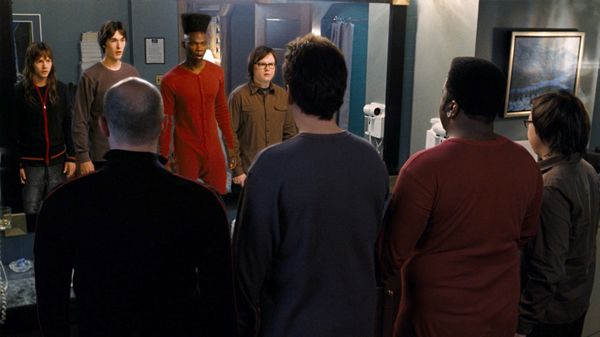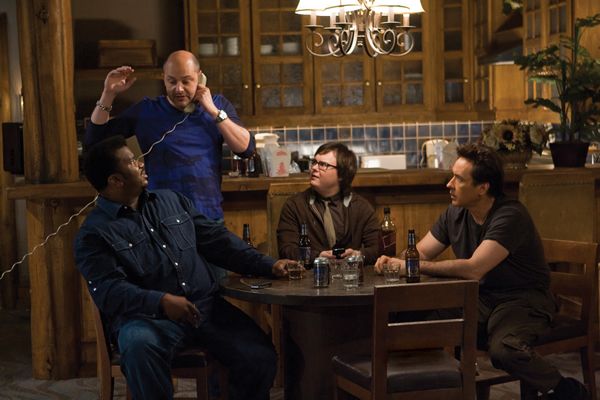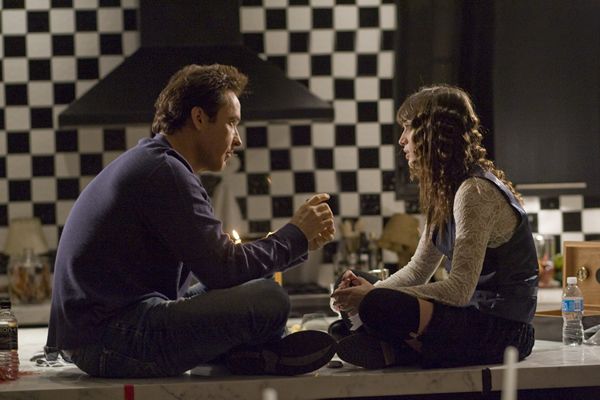Some writer-directors of comedy movies aren't funny in interviews. It's surprising, but it happens. However, Steve Pink is not one of those people. He's also very smart. He wrote Grosse Pointe Blank and High Fidelity and directed the underrated Accepted. His latest film, Hot Tub Time Machine, is damn funny and he had the skill to pull off a film that embraced the silliness of the 1980s but never insulted it.
I got to interview Pink at a press junket for the film a couple weeks ago. Among other topics, we discussed the references in the film, how it approached the 80s versus the present, the mechanics of time travel and how to balance it with the comedy, and the film's fantastic soundtrack. There was also a long discussion about a moral question the film poses but since that involves the ending, I've stationed it off with spoiler alert tags.
Hit the jump to read the full interview. Hot Tub Time Machine hits theaters on March 26th.
Crispin Glover told us that you never spoke to him about casting him as an homage or a link to Back to the Future. Is that part of the reason you cast Crispin?
STEVE PINK: Well thank God I agreed with Crispin in the last roundtable because I would have sounded like a schmuck if I had said, "No! I totally cast him because of that!" Because then Crispin wouldn't fuckin talk to me anymore!
[laughs]
PINK: Look, it's both, right? He's a great actor and he's hilarious and iconic for me but also as an actor, from River's Edge to...so, for me, not only Back to the Future, but all his other work from that time as well, so he's just one of my favorite actors, period. It did not escape me that he's in the most famous and successful time travel movie and the idea of bringing him in to do this movie was a really great concept. That being said, the way we treated most characters in the movie, we didn't call attention to it. He gets to play an independent character of his own and it's not important to reference the past. The past takes care of itself. It's Crispin Glover in the flesh. So that's true of Billy Zapka as well. We could have had him come in and play The Karate Kid kid. We could have him play "Johnny", and then you would have really known because a lot of people-
--didn't realize.
PINK: Right. I didn't want to put all of my chips on people knowing who he was, because what if he had come in as Johnny? I don't know how many people saw Karate Kid that time ago. And he's a good actor, so for him to just play his own version of "Rick, The Club Douche," and then not call attention to his other characters then if you get it's Zapka, then great. If you don't, then great. That's not important because I still have to make the scene work on its own.
And that's the case with John as well. You know he's 80s but you don't need to reference films like Better Off Dead or anything like that.
PINK: Right. We did and we had bigger jokes, but there's a small one as well. We had to juggle a lot, like the references, but most of all it just had to be good on its own, period. Because if it had just been, "Hey! Please laugh and enjoy at all these references!" you would have been bored out of your fucking skull.
That's what I was afraid of walking in. That's not what you made.
PINK: Yeah. I tried to stuff as much of I Love the 80s in there because it's important to support the idea of the 80s when it's fun, but I don't judge the references. Some references are more important than others. Like the metal stuff. Some people like Motley Crue and some people didn't listen to them at all. So that's why there's New Order and The New Replacements and David Bowie and Public Enemy.
And Fishbowl.
PINK: Are you talking about the quarters scene?
No, the t-shirt. When I saw that I was like "Wow. That's my 80s."
PINK: That's right.
The film seems to embrace the 80s rather than poke fun and instead it pokes fun at now. When you were writing the script did you intend-
PINK: How do you think it pokes fun?
Well, when looking at all the silly things we have now like Chernobly (an energy drink) and Clark's character and he's sort of the "modern guy" and he's totally out of place. And yeah, in the 80s there are some ridiculous things but it's like you said in that it's not constant parody.
PINK: Yeah, it's tricky in that way because most importantly you want to really like the characters because the more you like the characters, the more everything's funny. Anthony Michael Hall in Sixteen Candles, I watched it recently with my family because I hadn't seen it in a long time, and he's incredibly annoying for the first 40 minutes of the movie. Then, without changing a single thing he's doing, you start to laugh at everything does. So you're an hour into that movie and he hasn't changed anything and suddenly he's extremely funny because you've grown to like this weirdo who's incredibly annoying. He grows on you and because he grows on you, he's just more enjoyable, whether you like him or not. That example is what it's really, really important. If you don't go along for the ride with these people who are having to manage these ridiculous circumstances then you'll be bored out of your mind because then you're just relying on something to be funny and as soon as it's not funny anymore and you get bored, that's a bummer.
So yeah, and also in embracing the 80s, I was also like, "Let's embrace the 80s but also let's have the characters decide what they think of the 80s themselves. Obviously, Lou liked it more than John's character, Adam, who hates being in the 80s. That was a terrible time for him, apparently. But for Rob's character, Lou, it was a great time. You can't look back at the decade and say it was one thing to everybody because it's not.
And I liked having Clark. He's a smart dude. And having him as an actor and to him be in the movie and be the commentarian, and to let us see the distinction between the present and the 80s, he did that very subtle-ly and really well, I think.
How did it come about that you casted Chevy Chase?
PINK: Well, we all wanted him. I think John had known him from just being out and about in Hollywood and he called him and asked him to do it. That's my understanding.
He auditioned.
[laughs]
PINK: He auditioned and he didn't nail the role in the room. He had to come back a couple times. I had him work on a couple things and eventually he got it.
I think he's a little under-utilized in the film because you really want more set pieces. The role as written had such promise but we had so little time and he came in and so I actually think he's a little under-utilized in the movie because you want more. I want more Chevy, frankly.
Is everything you filmed basically in the movie due to time-constraints?
PINK: No, I just mean in terms of this is the role we have. It would have taken more writing. You don't realize how great the opportunity is, I mean, we realized how great it was, but then to really fill and say, "Well, we need to change the writing more significantly than we did. We just need to open it up a little more." And I think if we had opened it up a little more, he would have been able to take off more than he does. But it's not anything we left out of the film. But he's so good and he fulfills the role really well. I just wish there was more Chevy.
[SPOILER ALERT-This part of the interview goes into the ending of the film-SPOILER ALERT]
The film left me with an interesting moral question. It's that when they come back to the present and their lives are great, is it satisfying to come back to a brand new life that you didn't earn or create yourself?
PINK: Well, that...that's an interesting moral question.
[laughs]
PINK: Well, yeah. I think that first you have to address the paradox of time travel because you can't say he didn't earn it. He was living it paradoxically in real time while he was time traveling. Because if [Adam] was looking back at the pictures and he's married, so his parallel self was living in real time. In fact, he did earn it, so you can't say he didn't earn it because he did earn it. It's like you always exist in two places at once. That's the paradox of time travel.
But he doesn't remember anything.
PINK: Right, he doesn't remember anything or earning it, but that's what I'm saying. It's kind of a parodox. You said "moral"! I didn't say moral, you said moral!" So from a moral point of view, if I'm the guy who walked into these new set of circumstances, I can't say I morally didn't earn it because my parallel self did. Did I earn the version of my life that I walked into? I guess you could argue that my time-travel self did not. But, the version who wasn't my time-travel self did.
And also, when I was thinking about that shit all the time, the thing that occurred to me was that when you break it into principles, it's much more difficult to deal with. When you break it down into individual pieces, it's easier. Is it morally satisfying? I think I even wrote the line, "Was it wrong to exploit my knowledge of the future for personal gain? No!" But for Lou, am I saying that in this movie, you become rich, the only way to be happy is to become rich by going back in time and become rich? No. For Lou, yes. For Lou, he needed to be really rich. Now, I'm not making a general statement. I'm saying that character, Lou, who is out of his fucking mind, found satisfaction in it and in this case was a better person! He is! He has a family, he's nice to his family, he's a better person and he likes the riches that decision brought him. Craig's not like that at all. He's the conscience of the movie and he just wanted to have the satisfying life he felt he deserved. Now we did blow that out of proportion a little as well, frankly, but, that's as far as I took it.
[--END SPOILER ALERT--]
If this film is a success and you do a sequel, where do you think it would go?
PINK: Well, I'm superstitious so I don't. I said in the other room that if I was just riffing, is that they went back to one place, well Bill & Ted it and jump in and be in medieval times and then jump in and be in the American Revolution or jump in and be in the future. A lot of time travel movies do that, right? So they exploit that framework of a time travel movie. I don't know, but Lou's medieval self possesses the secret orb...[laughs] I don't know. It would be great to exploit the other time travel structures that we didn't get to because we only went to one period of time. And then what stories can come from that. And I was far more interested in this time travel stuff than I was able to express. Like the Terminator speech was something I brought in and that just makes me laugh because it's so true. That's the time travel stuff that really intrigues me.
Rob Corddry gave me a book to read that was really, really good. And NPR had this segment on time travel while we were shooting where this guy had mathematically proved you could time travel and had written a book about it and written this equation...and whether it could be done via hot tub...
[laughs]
Well you were talking about time travel and how do the mechanics of that get in the way of the comedy?
PINK: All the time! It always gets in the way of the fucking comedy! So when in doubt, throw out the time travel. It's like, "What's gotta go? We're sinking, something's gotta go, and it's not going to be the comedy." But for sure, all the time. Comedy is king. It has to be. Who knows anyway. I mean time travel? Are you kidding me?
What the balance between what you wrote and the improving that was done on set and how those played together?
PINK: Well, I think there's this myth of improv that goes like this: "Hey! We got all this money and we got a camera, let's put on a show!" Right? "Because we're so smart and we're so funny we can just say what ever the fuck we want and it's going to be awesome and the audience is going to enjoy it because we are comic gods!" And it doesn't work that way. But I read it in the paper all the time, like "They say the film was largely improvised." No, it wasn't. Like, "largely improvised" means, "We have a ball a string and we have some old gum wrappers, and we're going to fly to the moon!" You don't MacGuyver it.
So the answer is that once you have a very specific set of circumstances that tell all the little things: the character beat, the story beat, the emotional beat-what ever it is-and the comedy that expresses those ideas in each thing, then you have the dialogue that tells that story and then you take it from there. And because those guys are such brilliant improvisers, they're able to embrace whatever circumstance they're in and play that circumstance and then it becomes improvisational. A lot of what those guys did, which came purely out of the relationships, was like, "You were never my friend, motherfucker-hey, [speaking to me directly] that's kind of a cool long-sleeve, short-sleeve thing you're doing. I've never done brown and red. Do you think brown and red would look good on me? I dress mostly in black. Is black good on me?"
Are we doing an example or are you actually asking me?
[laughs]
PINK: Exactly. No, I was using it as an example. So they would constantly undermine the states of their characters, but that just came from those guys knowing each other so well. They would be able to move from the circumstances of the reality of their circumstances to something totally preposterous just because they knew each other's character so well and they knew each other's disposition in terms of who they were as character in that moment. And those guys are really good at using the sets, like diving in to where they are to get that kind of material.
How were you able to get all these great 80s songs for the soundtrack when licensing music costs a lot of money and this was a low-budget movie?
PINK: The studio supported the music budget really, really well and they knew it was going to be significant. I think we were still able to make it affordable because the musicians were really good about giving us the music and not killing us either. Believing in the project to a certain extent always makes things more affordable and we knew we had to deliver that. And I'm a music geek and I still miss a lot of stuff that could be in. I think we've got a really good spectrum from Public Enemy to The Replacements to New Order to David Bowie to Echo and the Bunny Men and then Poison that's a pretty full spectrum from the 80s but there's still some left out. I think we even have English Beat in there as well. There's such great 80s music that's not in the movie so I hope people will go, "I remember that song!" and then go listen to something else.
How did you come to "Let's Get it Started" as the "Johnny B. Goode" of this movie like it was to Back to the Future?
PINK: [faking indignation] The "Johnny B. Goode" rip-off! Is that what you're referring to!?
[laughs]
PINK: What is it you're referring to sir?
Nothing at all.
PINK: No, no, of course I'm kidding because we deliberately ripped-off all kinds of movies. Are you kidding?
[laughs]
PINK: We ripped-off every chance we got. Um, I just loved the song. You try to find a song that you'll listen to next year in life. So it had to be a current song but had to be different in the way music is produced so I think Black Eyed Peas are kind of unique in the ways they produce their songs. Their songs are very current. It's not like the songs you heard then, and so that was one aspect of it. And then the other aspect of it was that it was a good enough song to last a little while. And I personally think it's a genuinely good song that will have legs for a long time.
Why did you choose the radio version? It's originally "Let's Get Retarded."
PINK: That's a really good question. I never thought about it.
Stumped you. [laughs]
PINK: I guess to me it's thematically the same. The lyrics don't really matter. I didn't make a comment that the original track was this and they changed the lyrics so it became a big hit on the radio...I didn't really think about it. It wasn't relevant to the scene. Some music is more relevant to the scene than other times.
[At this point Rob Corddry came into the room and started mocking what Pink was saying. Look for my interview with Corddry, Clark Duke, and Craig Robinson tomorrow night]


